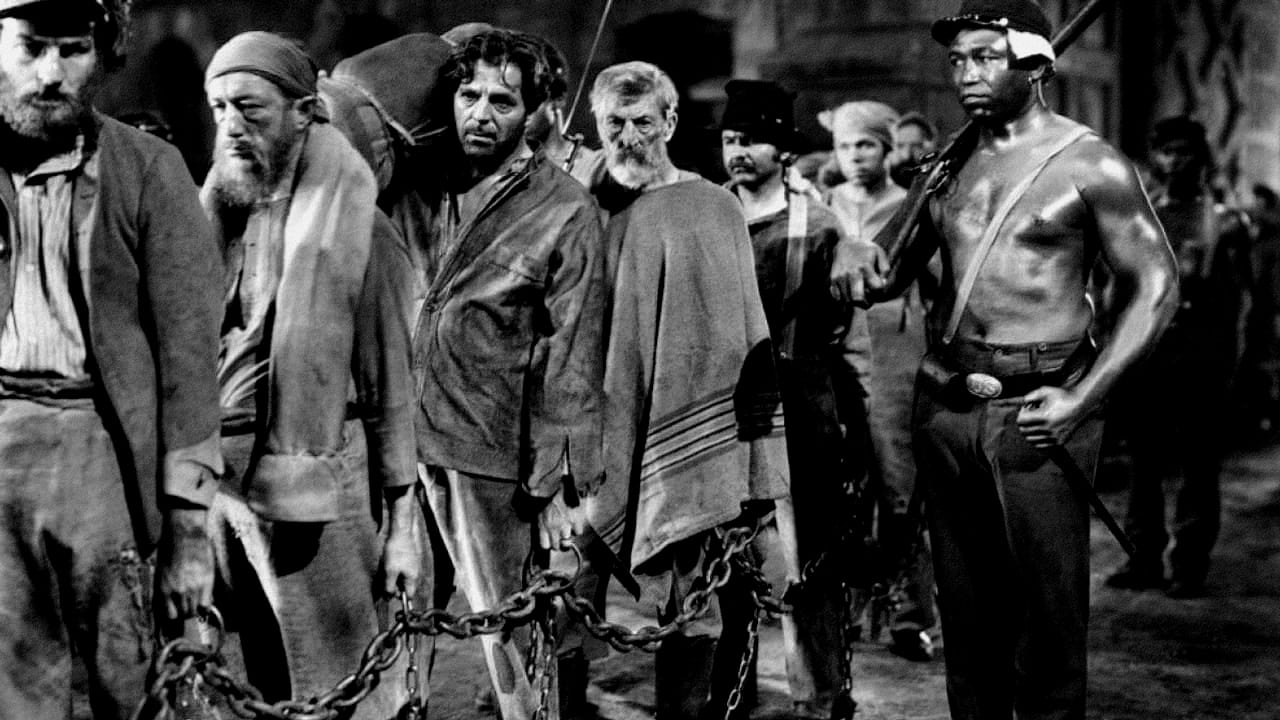

not horrible nor great
... View MoreHow sad is this?
... View MoreExcellent, Without a doubt!!
... View MoreAll of these films share one commonality, that being a kind of emotional center that humanizes a cast of monsters.
... View MoreAbraham Lincoln's assassination is the basis of this interesting film that tries to do justice to a Southern doctor that is accused of abetting the man that killed the President. The story begins in 1865 as the Civil War ended. Abraham Lincoln, one of the most beloved, and hated men in the new republic, appears in the White House balcony to address the troops. He makes a surprise announcement when he asks the band to play "Dixie", something that was meant to be a conciliatory gesture. Lincoln's murder by John Wilkes Booth at the Ford theater, brings Dr. Samuel A. Mudd into the investigation.Dr. Mudd, a Southern doctor, happens to be at home when the fleeing assassin needs the services of a physician to treat his broken leg, the result of having jumped to the stage after killing Mr. Lincoln. The doctor and his wife are dumbfounded when the companion of Booth gives him a fifty dollar bill for a two dollars job. They are quite taken aback, but it is too late to return the money since the men had gone away. The boot that was ripped from Booth surfaces during an investigation being conducted that follows the trail followed Wilkes took to escape the police.Because of the circumstantial evidence, Dr. Mudd is taken prisoner. The trial that ensues condemns the doctor to life in prison, something the real conspirators did not get. His sentence is to be served in the prison at Fort Jefferson, in the Dry Tortugas, off the Florida coast. The jailed Dr. Mudd finds an avowed enemy in the cruel Sgt. Rankin, who vows to make his life miserable. The onset of yellow fever changes things for Dr. Mudd. He is called to assist the sick men. The story ends in a good note as Washington pardons him for his role in containing the outbreak.John Ford joined forces with Nunnally Johnson in a film that, as seen today, still holds the viewer's attention after more than seventy years of having been made. Mr. Ford, perhaps the best director in the history of American cinema, shows why he was a man that understood what the movie going audiences wanted. He treated the material with reverence, as he focuses his attention on a man that for all accounts had nothing to do with the assassination of a US president.Warner Baxter, playing Dr. Mudd, brought a raw intensity to the way his character needed to show. Mr. Baxter had a great role in the falsely accused doctor, as he showed in the film. Gloria Stewart is seen as Mrs. Mudd, a valiant woman who believed in her man's innocence and stuck to her principles. John Carradine made an excellent Sgt. Rankin. Ernest Whitman, Francis McDonald, Fred Kohler, and O.P. Heggie, are featured in the large cast.
... View MoreOne of the most fascinating aspects of John Ford's 1936 film is the Black participationElements of stoicismReal moments of something that looks like intimacy between Buck and Dr. MuddBuck not simply functioning as the classic enablerThe joyful fecundity that looks forward to Donovan's Reef: "Rosabell did it again!"A racial cliché conflated with paganistic humanism. Which looks forward to The Quiet ManMoments where actual Black anger and rage can be felt: "Keep moving, White man" and the sight of all of those armed and rebellious Black soldiers barricadedWhich somehow seems like a moment from the period of Black Power - teleologyAnd somehow "Shoot, nigra!" which is a clear parallel feels like (and is) the same old racism...shocking that this was still acceptable in 1936Mudd is a man of the Confederacy, and the film takes place right after the Civil WarThus the racial tension of this film feels appropriate. Raw, sometimes painful to watch, but appropriateAt no point does Ford show his hand (the way he does in Fort Apache or The Searchers), and so we are left wondering how much is depiction and how much is a statement of Ford's own racial attitudes. This is one of the things that makes the film such a complex textRecent "period" films which show blacks coming and going wherever and whenever they please display the most pernicious Political correctness. They dispense with a whole uncomfortable element of the society of the time which is being represented, an element which a conservative like Ford has no problem looking squarely in the face.Expressionismmuch talk about the influence of Murnau and SunriseBut expressionism is not merely a series of positions and a stylish use of fog and shadow.Expressionism - especially German Expressionism of the period of Caligari and Nosferatu is connected to externalization of psychological states: shock, horror...Murnau found a deep lyricism and romanticism in his development of the expressionist vocabulary. What Ford took from this was ultimately external. The purification of his style leads him to reduce such elements to the point where in The Searchers they are not consistent parts of the mise en scene but rather colors used for underscoring, heightening the deceptively "natural" look of the film.In Prisoner of Shark Island we are still in a Murnau-ish looking world. But Ford's approach to character is radically different from that which is found in Murnau. The discipline found in obeying some idea of a higher authority is always behind the action of Ford heroes. The Hippocratic Oath functions here much as the Navy or Cavalry will function in mature - period Ford. There is ambiguity in Ford characters and their will is tested. But ultimately they always choose the path that has been assigned to them. The expressionistic anti-hero, racked by doubts and pulled ever which way by his appetites and his desires is unknown to Ford. The shadowy, foggy world of German Expressionism is ultimately not appropriate to Ford's stoicism.Part of this look is Ford and part of it is a mid-Thirties style. Even Fritz Lang's films lost a lot of their expressionist look as '30's moved to '40's moved to '50'sAs Eyman says on the commentary track, this is not "A John Ford Film" CarradineThe only performance in this film that could come right out of Nosferatu - but equally right out of a late-19th century potboiler - is that of John Carradine as the sadistic jailer. A deliriously stylized performance, and one which influences our sense of the "tone" of the film. He sides with the artificial element of the mise - en - scene, calling the ultimate agenda of the film into questionVictor Hugo, hélas So said Andre Gide when asked who was the greatest French poet...It's somewhat the same feeling I have when I think of my pantheon of American filmmakers.There's a whole series of filmmakers whose aesthetic and sensibility is so much closer to mine: Fuller, Welles, Ray and such émigrés as Sirk, Ulmer, Lang...But the fascination with Ford has much to do with his stature. His signature is writ so large, and he's able to include so many of our contradictions. Now, well maybe not more than ever, but at least as much as ever, we need Ford. Within the mainstream of American thinking (there is very, very little "counter-cultural" about Ford) he provides a clear-headed critique and a vision full of ambiguity. This becomes obvious only in a few films: They Were Expendable, Fort Apache, The Searchers, The Man Who Shot Liberty Valence.But I propose that The Prisoner of Shark Island is a worthy and important addition to this list.And as I said before, this is not an Auteurist MasterpieceAt this point, Auteurism is a fact of life. It shouldn't be necessary (I hope it isn't) to argue that a director has a signature. Of course, what makes this difficult, in terms of the establishment of hierarchy, is the fact that film is such a deeply collaborative art. That the director's vision is the key and ultimate vision of a film seems debatable, on a case-by-case basis.
... View MoreIt has been a long time since I have seen this movie, but it was very enjoyable and moving. I am not familiar with the facts of Dr. Mudd's life sentence after he was imprisoned, but he was not a victim of circumstance. According to the novel I am reading regarding the escape of John Wilkes Booth, Dr. Mudd was an acquaintance of John Wilkes Booth prior to the assassination and had at one time agreed to aid Booth in escaping with Lincoln after kidnapping him, a plot that fell through a year before the assassination occurred. With his leg broken, Booth sought out Dr. Mudd as he was a Southern sympathizer, an acquaintance, and a doctor. He fed Booth, let him sleep in his house, and lied to the soldiers hunting Booth as to aid him in his escape from justice, all with full knowledge of his deeds. Sadly, this is not what is seen in the movie, but much like most of history has been distorted to make people feel guilty about someone with supposedly good intentions. Still, an enjoyable movie with a good heart, even if it is not based in fact.
... View MoreI chanced upon this movie today on television and could not stop watching it until its end. I am glad I did not miss much. It is a fascinating story of the doctor who treated President Abraham Lincoln's assassinator, John Wilkes Booth's broken leg. I feel that Mudd certainly knew it was Wilkes who came to his house that early morning--how could he not---but he was a doctor and thought that treating his leg was justified. Apparently, the court did not and sentenced him to a life term. In any event, he proved invaluable when a yellow fever/yellow jack epidemic ran rampant in the prison he was confined in on the island called Dry Tortugas in the Gulf Of Mexico, now a national park and monument in Florida, 70 miles west of Key West. For his selflessness and bravery in aiding his fellow man and his doctoring skill, he was pardoned by the President and was able to live the rest of his life as a free man and, of course, rejoin his family. It is debatable whether the real Samuel Mudd knew he was aiding an abetting John Wilkes, I feel, he did, but, as said, was just doing his service as a physician. This is a excellent old fashioned, good movie to watch and you should not miss it.
... View More